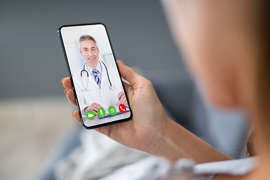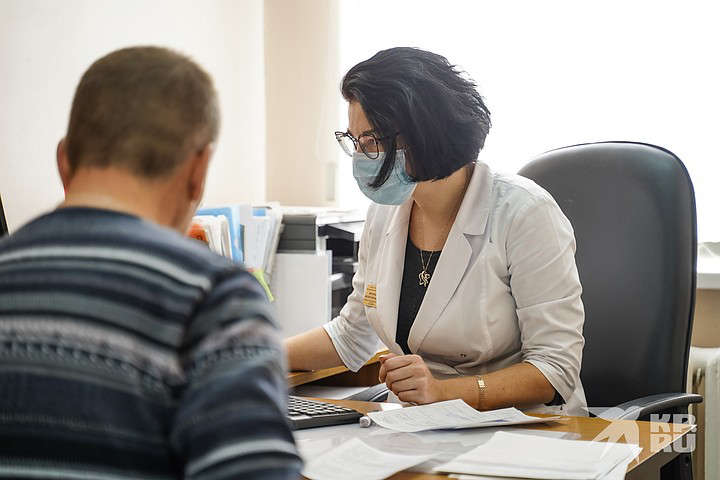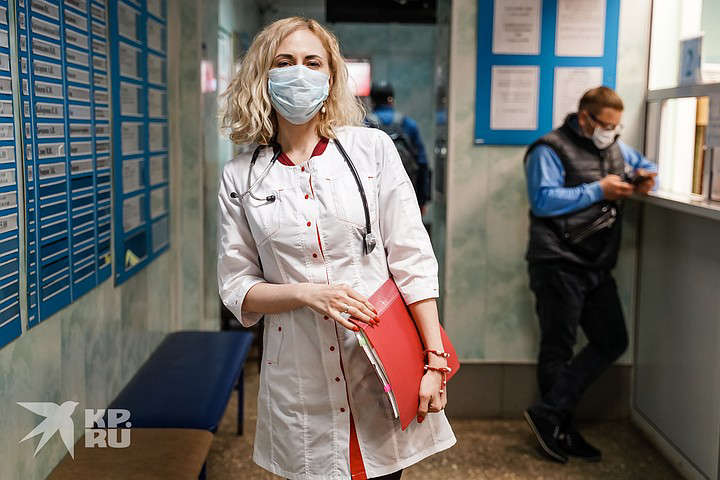
For many of us, a visit to the clinic is stress, wasted time and a lot of money. And it is not even so important whether it is a private clinic or a public one – there are many claims to both. What needs to be changed in the medical kingdom to finally serve the patient? Denis Sokolov, an expert and independent researcher (formerly a senior researcher at the International Laboratory for the Economics of Health Care Reform of the RANEPA), came up with an idea to abolish the medical bureaucracy, which acts as an intermediary between a doctor and a patient. The mobile application, says Sokolov, will be able to allocate resources much more efficiently, manage financial and human flows. And the money saved will go to the treatment of patients and the salaries of doctors. Tempting right? On the air of Radio “Komsomolskaya Pravda” (97.2 FM), we talked with the author of the idea. And we tried to understand in which direction health care should evolve.

Yandex doctor treats you
– Denis, we were all fascinated by your idea to manage healthcare through a mobile application. How will it technically look like? A medical version of the Yandex-taxi application will appear? There will be, relatively speaking, a Yandex doctor with a rating of doctors, with tariffs for comfort, business, economy, and so on?
– To some extent, yes. It is clear that this comparison is a big stretch, since medicine is a much more complex thing than a taxi. But the idea is precisely to eliminate the bureaucratic lining between doctor and patient. Because the medical bureaucracy creates a lot of problems and creates quite large costs. A hundred years ago, the Semashko system was just a revelation for Soviet Russia, then it was a poor country in which there was a shortage of doctors and equipment. But today the system, when the state accumulates and distributes money and medical resources, is ineffective. Attempts to fix this have been made in Russia since the 90s, when they tried to introduce insurance medicine in our country. In reality, the introduction of insurance medicine in its current form is practically the preservation of the old system with new names. Because, by and large, there is no difference who sits down on financial flows – regional health departments or insurance companies. All the same, a penny will reach the doctors and the patient.

– But medicine is still free, at least its basic level …
– It is somehow even inconvenient to repeat the axiom that medicine can only be paid for, the only question is who pays? Ultimately, the notional taxpayer pays. But his money goes a crooked path, either through public health financing or through insurance companies. In either case, the interests of those who allocate resources rarely coincide with the interests of the patient. The patient needs to be cured, the distribution system needs to master the money. Hence the idea to replace the pay-as-you-go system with an application like Yandex Taxi that you mentioned. If necessary, open the application and you are immediately offered options. You can go for examination at this center and you will be paid from your personal account. Or your insurance will pay if you are insured. And to get to another center, you will have to pay extra and so on …

Save on an official, not a patient
– Now a standard visit to the doctor looks like this: a patient comes and complains about his health. The doctor replies: “What do you want, my friend, age?” And the patient leaves scorched by the sun with a useless prescription in his pocket … But how should it be?
– First, it is important to understand that the patient comes to the doctor with money. This can be an insurance policy, personal account, cash, bank account, etc. Why does the doctor say – you are old, it is useless to treat you? Because he has limited resources and tries not to waste them. Any managerial link from above requires cost limitation. And when the motivation of the doctor is not related to the provision of qualified assistance to the patient, nothing good comes of it. Then the doctor is afraid to go to the operation, because the operation is a risk, he may be put on trial. Or he is afraid to make a decision on additional studies, because the insurance company will not pay for them, then there will be an unpleasant conversation with the head physician, why he ordered tests, because of which the institution incurs losses.
– And secondly?
– And secondly, I think that at the current level of technology development, one can try to do without the primary link.
“Take a picture of your rash with your phone camera”
– How, without clinics, army of district doctors and nurses?
– What do you get from the therapist? At this stage, physicians are mainly concerned with the administration and routing of the patient flow. An appointment with a local therapist lasts a few minutes, most of the time he fills out papers and directions. All this work on the initial selection of a diagnosis, determining the list of necessary studies can be undertaken by electronic expert systems, online consultations with specialists. Today, many technologies have appeared that help the patient at the initial stage. There are various rapid tests that allow you to quickly make a preliminary diagnosis. There are mobile applications that allow you not only to measure blood pressure, pulse, but also to watch blood oxygen saturation. Developments have appeared that give out a list of possible diseases and risks based on an analysis of changes in your appearance in a selfie. There are programs that, based on a photograph of a skin fragment, can tell you where to go in terms of diagnosing peripheral vascular disease or skin disease …
– Wait, in this very place the people, hearing your words about electronic expert systems, will instantly howl and begin to be indignant: does it mean that we are offered telemedicine and will be treated on TV and by phone? It seems that we are not ready for this yet.
– Yes, of course, not ready. But when the people became anxious about the pandemic, everyone immediately switched to telemedicine and medicine over the phone. If it is profitable for people, they instantly master communication in messengers, conferences in Zoom, and mobile banking, which is hardcoded into the phone. There are a lot of nuances, but I would not think that this is some kind of insurmountable obstacle.
Of course, the need for a primary link can be removed only with oncoming traffic. We need a highly qualified patient, this is a person who understands or is ready to understand the main diseases with which he may be associated. Today there are plenty of opportunities to do this, information is the sea. Besides, maintaining your own health is a very motivating thing.
What to do with an army of charlatans?
– But what about grandparents – the main regulars of polyclinics – will understand mobile applications and telemedicine tricks?
– They can be helped by a close relative, a buzzer grandson, or even a doctor who was asked to represent this patient in this market.
– There is no fear that if our mass patient is given a personal account with money and the opportunity to choose, then he will run to give money to cosmobioenergetics, urine therapists and so on. A huge army of charlatans is flourishing in the country with the help of public money. How can you avoid this?
– It's quite difficult to avoid this in the wild market. But if we are talking about a market where, in addition to a qualified patient, there are sufficiently qualified and independent professional doctors, I think we will solve this problem. People are not stupid enough to spend money on charlatans. Don't underestimate people's ability to organize themselves. I know a Dagestani village, which was known for the protests of truckers (many there earn in this way), where, during the pandemic, in April-May, the local community organized qualified medical care at a level that was achieved in the instructions of official medicine only in the fall of 2020. In this village, in the spring of last year, blood saturation was measured, the supply of oxygen and necessary drugs, including hormonal ones, was adjusted. And they organized intensive therapy for the elderly at a fairly good level. A good local doctor and a proactive community were behind this. In the pandemic, there are many examples when people on social networks quickly found doctors who could give normal consultations through the phone, via e-mail.
Dividends for the patient and the doctor
– Can you formulate what patients and doctors will get from this reform in the end?
– First, huge cost savings. For example, primary care today is 25-35% of the consolidated health care budget. And we estimate this entire budget at $ 60 billion. Accordingly, much more money remains for medicine.
Second, this is a serious optimization of medical personnel. If you look at any medical institution, then not all medical staff who are on the staff actually work. Usually 10-20% of professionals work for wear and tear, the rest are engaged in office work. Those people who work seven days a week, 24 hours a day, burn out by the age of 45. Moreover, they work hard for very little money, because doctors began to receive adequate salaries only when the coronavirus happened. And so doctors work, in fact, for bread and clothes. Not only can they not capitalize on their professional activities throughout their lives, they still do not have the opportunity for professional growth. Because they do not have time to improve their level, go to advanced training, learn something new, read magazines. Medicine does not stand still for a second, and in order to remain a professional, you need to constantly improve your qualifications. Ultimately, the patient will also benefit from this, because he will be treated by a knowledgeable doctor who is motivated to help the patient.
The third thing that the patient receives is that he significantly improves his qualifications. Qualifications, of course, philistine, but medical. All today's experience suggests that a person with a good medical qualification – namely, a household one – has a chance to receive much better quality care than a person with money, but without such qualifications. To correctly describe your condition, to be able to ask the necessary questions to the doctor, to assess the scientific nature of his answers – this helps a literate patient right now.
And the fourth story is a direct entry into the global market of modern medical technologies, which in general today can increase the duration of a quality life for people from 20 to 50 years.
Extending our life
– What kind of market is this?
– At the modern level of technology, provided you have a correct lifestyle and a timely visit to a doctor, you live much longer. That is, by the age of 50 or 60 you do not have problems from metabolic syndrome or coronary artery disease, high blood pressure or type 2 diabetes – everything that happened in the previous generation in almost all people who crossed this age line. You avoid this, because you can monitor your cancer markers and avoid advanced oncology, which takes many people ahead of time. Today there are examples when people who tracked down the same prostate cancer in time live another 30 years. And this is the situation for many different cancers. Moreover, new technologies and their timely application make it possible to extend not just life, but a quality life, when a person remains efficient and is able to enjoy life.
– But you understand what resistance you will meet. On the one hand, there are hundreds of thousands of patients who have no time or do not know how to get the qualifications of a literate patient, who do not believe in new technologies and telemedicine. And on the other hand, tens of thousands of district therapists, aunts from the registry, who will be on the street …
– For now, I propose to simply comprehend this idea. It is very difficult in modern Russian society to discuss the argument that medicine will still be paid. Although it is already paid. People just don't want to think about it.
OPINION OF THE SKEPTIC
Evgeny Timakov:
The elimination of primary care will kill health care!
We asked the chief physician of a private clinic, immunologist, pediatrician Yevgeny Timakov to comment on the ideas of Denis Sokolov.
– As for the idea to reduce the burden on primary care and relieve therapists through the development of telemedicine communications and technologies – here I probably agree. – says Evgeny Yuryevich – There are a number of cases when you do not need to come to a therapist, who is indeed often a coordinating link in the appointment of a consultation of narrow specialists. For example, if I have ear pain, I cannot now make an appointment with an ENT directly until I get an appointment with a therapist who will give a referral. In this sense, the electronic expert system, as a coordination link, will take a huge burden off therapists and pediatricians. That is, you will follow the algorithm for the introduction of certain symptoms, complaints, and robots can independently refer you to the specialist you need. It is also reasonable to shift telemedicine to repeated consultations, when you communicate remotely with a doctor who has already seen you and can assess your condition.
But removing the primary link, as such, would be a murder for the health of our population. Because no one has canceled the human factor: a doctor must see a patient, no remote consultations can replace this. People are often confused about their condition. The doctor at a personal appointment will receive a more complete picture of the course of the disease.
– Is it possible to eliminate the medical bureaucracy with the help of mobile technologies?
– Yes, if by bureaucracy we mean the redistribution of the primary flow. But removing the centralized management of health care is by no means possible. It will be total chaos. The Semashko system in the context of the coronavirus pandemic actually proved to be the best in the world! And questioned the viability of European health systems. But Denis Sokolov proposes to switch to the European rails of remote consultations. In many European countries, there is no longer primary care, there is a general practitioner. Among my patients there are a lot of people with dual citizenship and, believe me, not one of them is satisfied with the healthcare system in those countries where they mostly live. I'm talking about Europe. Nobody is happy with the remote counseling system. Nobody is happy that you cannot call a doctor at home when your temperature is 39-40.
– Well, what is the path of development, what do you think?
– For the nation to be healthy, you need to go to the doctor not in case of illness, but for prevention. Ideally, the task of health care is not to treat the sick, but to make sure that the person does not get sick.
The computer will not do prophylaxis. Prevention is working directly with a doctor, an annual medical examination, so as not to miss certain hidden factors. I am a pediatrician and I know how much we catch now on the approach of threatening and difficult conditions from oncology to blood diseases, thyroid diseases, precisely during preventive examinations. The doctor sees a huge variety of nuances, notices changes in the blood tests that no computer will show you. It is impossible to switch to a complete digitalization of healthcare, it is dangerous for the health of the nation.

